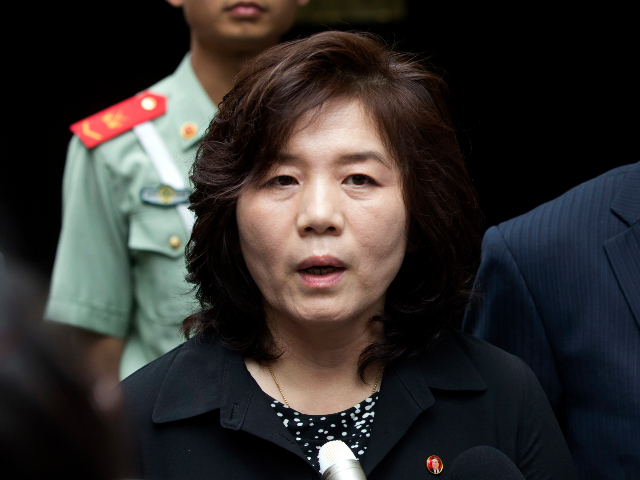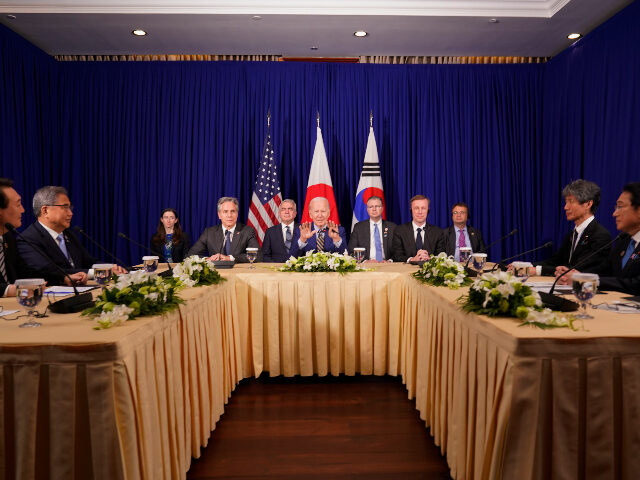The foreign minister of North Korea, Choe Son Hui, published an angry screed against America vowing Pyongyang would become a “more serious, realistic, and inevitable threat” to America so long as Washington pursued cooperation with South Korea and Japan.
In an apparent attempt to make the threat appear more severe, North Korea fired a short-range ballistic missile (SRBM) into the Sea of Japan towards the south, the latest in similar bombings towards South Korea and Japan that have grown in frequency in the past two months.
The outburst followed a meeting in Cambodia bringing together leftist President Joe Biden, conservative South Korean President Yoon Suk-yeol, and conservative Japanese Prime Minister Kishida Fumio in which the three reportedly spent ample time discussing the consistent threat that North Korea presents to the region and the world. Experts within all three governments have been predicting an upcoming nuclear weapons test since at least May, though North Korea has yet to execute one. North Korea has conducted six nuclear weapons tests, the latest in 2017. Four of them occurred while Biden served as vice president.
North Korean state media has referred to Biden as a “rabid dog” and suggested he be “beaten to death with a stick.”

FILE – Choe Son Hui, deputy director general of the Department of U.S. Affairs of North Korea Foreign Ministry, briefs journalists outside the North Korean embassy in Beijing, China on June 23, 2016. North Korean leader Kim Jong Un promoted the veteran diplomat with deep experience in handling U.S. affairs as his new foreign minister during a plenary meeting of the ruling Workers’ Party’s Central Committee convened during June 8 – June 10, 2022. (AP Photo/Andy Wong, File)
“I clarify a serious warning stand toward the fact that the U.S., Japan and [S]outh Korea held a three-party summit a few days ago and talked about ‘bolstered offer of extended deterrence’ and ‘strong and resolute counteraction,'” Choe, the foreign minister, said in her debut missive since taking office this year, “describing the DPRK’s [North Korea’s] legitimate and just military counteractions, incited by their war drills for aggression, as ‘provocation.'”
“The recent tripartite talks will finally result in bringing the situation on the Korean peninsula to an unpredictable phase,” she continued. “The keener the U.S. is on the ‘bolstered offer of extended deterrence’ to its allies … the fiercer the DPRK’s military counteraction will be, in direct proportion to it, and it will pose a more serious, realistic and inevitable threat to the U.S. and its vassal forces.”
Choe concluded with the traditional dramatic flourish of a North Korean government statement, warning that America “will be well aware that it is gambling for which it will certainly regret.”
South Korea’s Foreign Ministry responded to the statement with a confirmation that it would not change its friendly disposition toward Japan or America in response.
“North Korea’s illegal nuclear and missile provocations, which clearly violate a number of U.N. Security Council resolutions, will lead to the strengthening of the South Korea-U.S. alliance’s deterrence and security cooperation among South Korea, the U.S. and Japan,” a ministry spokesman said on Thursday.
Choe’s threats came accompanied by the launch of what South Korean authorities believe was an SRBM into the neighboring Sea of Japan, or East Sea. South Korea’s JoongAng Ilbo observed that the latest launch occurred eight days since the last missile barrage, the “longest break from missile tests since Sept. 25” for North Korea.
The projectiles stopped long enough for the leaders of America, Japan, and South Korea to meet this weekend. The three held a joint press conference in Cambodia on Sunday prior to meeting behind closed doors, telling reporters that they would prioritize the threat North Korea poses to the region in their discussions.
“Japan and the Republic of Korea are both critical allies of the United States,” Biden told reporters. “And for years, our countries have been engaged in a trilateral cooperation out of a shared concern for the — for the nuclear and missile threats North Korea poses to — to our people. And North Korea continues provocation — provocative behavior. This partnership is even more important than it’s ever been.”
Kishida called the recent barrage of North Korean shots fired “unprecedented both in their frequency and their manner.”
“It is extremely, truly timely that the Japan-U.S.-ROK [South Korea] trilateral summit is being held at such a juncture. And I truly hope that our trilateral cooperation will be cemented further as we counter such challenges resolutely,” Kishida asserted.
Yoon, speaking last, condemned Pyongyang’s “more hostile and aggressive provocations.”
“Since I took office in May, North Korea has launched some 50 missiles to date,” he observed. “And from the end of October to early November, its missile-firing was intensive — one of which flew over the eastern part of the Northern Limit Line and landed in our territorial waters.”
The White House readout of the meetings between Biden and Kishida and Yoon separately indicated that North Korea was the major focus of those conversations.
“The two leaders condemned the Democratic People’s Republic of Korea’s (DPRK) destabilizing and threatening actions in recent weeks, including military operations near the border area and the launch of an intercontinental ballistic missile,” the White House readout of the Biden-Yoon meeting noted.
“During the meeting, President Biden reaffirmed the U.S. extended deterrence commitment to the ROK using the full range of U.S. defense capabilities,” it continued, “including nuclear, conventional, and missile defense capabilities and emphasized the U.S. commitment to identify additional steps to further reinforce deterrence in the face of DPRK nuclear threats.”
Biden also claimed a day after those meetings that he had brought up North Korea’s belligerence in conversation with Chinese dictator Xi Jinping, North Korea’s closest ally.
“I made it clear to President Xi Jinping that I thought they had an obligation to attempt to make it clear to North Korea that they should not engage in long range nuclear tests,” Biden told reporters following the over three-hour meeting with Xi in Indonesia.

COMMENTS
Please let us know if you're having issues with commenting.